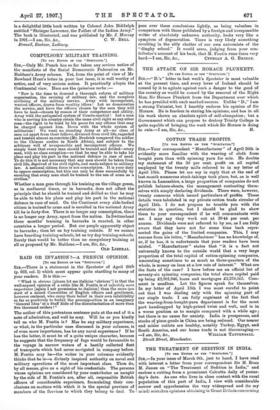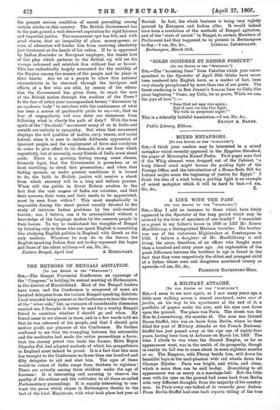THE TREATMENT OF SEDITION IN INDIA. [To Tat EDITOR Or
THE "SPECTATOR."] SIR,—In your issue of March 9th, just to hand, I have read with interest a letter from your correspondent Sir H. Evan M. James on " The Treatment of Sedition in India," and enclose a cutting from a prominent Calcutta daily of yester- day's date. As one who lives in close contact with the rural population of this part of India, I view with considerable sorrow and apprehension the very widespread and (to my mind) mistaken opinions obtaining in Great Britain concerning the present serious condition of unrest prevailing among certain circles in this country. The British Gcriernment has in the past gained a well-deserved reputation for rigid fairness and impartial justice. The commonest ryot has felt, and with good reason, that no inequality of place, money-power, or even of education will binder him from receiving absolutely just treatment at the hands of his rulers. If lie is oppressed by Indian Zemindar or European employer, the innate love of fair play which pertains to the British raj will see Lis wronge redressed and establish him without fear or favom•. This has undoubtedly largely accounted for the stability of the Empire among the masses of the people and its place in their hearts. Are we as a people to allow this national characteristic to be obscured through the intrigues and efforts of a few who are able, by reason of the educa- tion the Government has given them, to reach the ears of the British nation through the medium of the Press ? Is the fear of (what your correspondent terms) "discussion by an academic body" to interfere with the continuance of what has been a source of pardonable pride to us,—viz., that no fear of unpopularity will ever deter our statesmen from following what is clearly the path of duty ? With the true spirit of the " Swedeshi " movement many of us in India and outside are entirely in sympathy. But when that movement displays the evil qualities of malice, envy, venom, and racial hatred, when it is seen to include deliberate oppression of ignorant people, and the employment of force and rowdyism in order to give effect to its demands, it is one from which regretfully, but of necessity, many friends of India must stand aside. There is a growing feeling among some classes, formerly loyal, that the Government is powerless, or at least unwilling, to check this persecution; and when that feeling spreads, as under present conditions it is bound to do, the faith in British justice will receive a shock from which recovery will be a long and tedious process. When will the public in Great Britain awaken to the fact that the vast maims of India are voiceless, and that their sorrows, their woes, and their needs, to be appreciated, must be seen from within ? This most emphatically is impossible during the short period usually devoted to the study of intricate Indian problems by the cold-weather tourist; nor, I believe, can it be accomplished without a knowledge of the language spoken by the common people in their homes. To try to understand the thoughts of Bengal by listening only to those who can speak English is something like studying English politics in England with Greek as the only medium. Whatever he may do in the future, the English-speaking Indian does not to-day represent the hopes and fears of the silent millions—I am, Sir, &c.,



























































 Previous page
Previous page